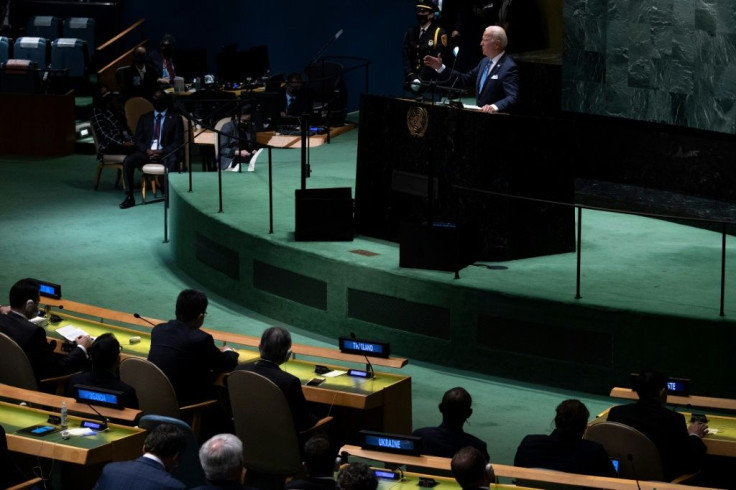Biden Praised After Pledging To Double US Climate Finance Contribution
President Joe Biden pledged Tuesday to "double" US contributions towards a goal of mobilizing $100 billion for countries hardest-hit by global warming, a move hailed as a rare piece of good news in the climate crisis.
Experts said the announcement would take the American contribution to the commitment, made by developed countries ahead of the 2015 Paris agreement, to approximately $11.4 billion annually.
"This will make the United States a leader in public climate finance," Biden told world leaders in New York, saying he would work with Congress to achieve the goal.
The announcement comes weeks before the next major UN climate conference, COP26 in Glasgow. The summit is seen as critical to keeping alive the goal of limiting long term warming to 1.5 degrees Celsius above pre-industrial levels.
"Strongly welcome @POTUS further doubling climate finance commitment to over $11bn by 2024," tweeted British lawmaker Alok Sharma, who will preside over COP26.
"This demonstrates the increased ambition required to deliver on the $100bn/year goal," he added. "We must build on this momentum."
The accord calls for public, multilateral and private financing of $100 billion a year from 2020 to 2025 to assist poor nations already coping with floods, heatwaves, rising seas and superstorms made worse by climate change.
This includes supporting countries transitioning to greener economies and ending reliance on fuels like coal that were essential to the economic rise of today's wealthy nations.
Last week, the OECD confirmed that only $79.6 billion was mobilized in 2019, leaving a $20 billion shortfall.

Climate advocacy groups, which had been calling for an increase in US funding to $12 billion a year, largely welcomed the announcement.
"President Biden's commitment to scaling up international climate finance to $11.4 billion per year by 2024 is a welcome and much-needed sign that the United States is finally taking its global climate responsibilities seriously," said Rachel Cleetus, of the Union of Concerned Scientists.
"Climate vulnerable nations -- particularly low- and middle-income countries -- are already reeling from an unprecedented onslaught of climate-related disasters and desperately need financial support to adapt and build resilience to worsening impacts."
Thanu Yakupitiyage, of 350.org, added: "We applaud President Biden's pledge to double climate aid for nations hit first and hardest by the climate crisis.
"The United States is responsible for the largest amount of historical emissions driving climate change and is the world's largest economy."
British Prime Minister Boris Johnson, who hosted a closed-door meeting between world leaders Monday, as well as European Commission President Ursula von der Leyen, had both prior to the announcement singled out the US for failing to contribute its fair share.
The $100 billion annual commitment is a key goal for UN chief Antonio Guterres, who also wants to see nations allocate 50 percent or more of their climate financing for adaptation in the developing world.
Currently, two-thirds of the funding is for mitigation -- reducing climate change -- rather than adjusting to current and expected future changes, such as sea-level encroachment, more intense extreme weather events or food insecurity.
The US announcement amounted to a rare piece of hopeful news on the climate front following a slew of high-level scientific reports painting a bleak future picture, as the world's top polluters continue to spew greenhouse gases at alarming rates.
Last week Guterres warned the world was on a "catastrophic" path to 2.7 degrees Celsius heating according to a new study by UN scientists.
The figure would shatter the temperature targets of the Paris climate agreement, which aimed for warming well below 2C and preferably capped at 1.5C above pre-industrial levels.
With only 1.1C of warming so far, the world has seen a torrent of deadly weather disasters intensified by climate change in recent months.
© Copyright AFP 2024. All rights reserved.





















